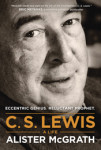In the world of apologetics, there are few arguments more famous than C.S. Lewis' trilemma, which is found in his most popular apologetic work, Mere Christianity. Even classic arguments like Anselm's famous ontological argument for the “being greater than which nothing can be conceived” and Pascal's wager, while still part of the discussion of apologetics, have not in recent years been as popular, or reviled, as Lewis' trilemma. It even spawned a book (Josh McDowell's More Than a Carpenter) and a song (Dana Key's “Liar, … [Read more...] about Re-Examining Lewis’ Trilemma
C.S. Lewis: A Life
Review of Alister McGrath, C.S. Lewis — A Life. Part II
Review of Alister McGrath, C.S. Lewis -- A Life: Eccentric Genius, Reluctant Prophet (Carol Stream, IL: Tyndale House, 2013) for the Emerging Scholars Network (ESN). Part II. Click here for Part I. Things which I felt did not work: Moving on to things that I found difficult about the work, I think the biggest thing was that the writing style was confusing to me. At times, McGrath seemed to fall into the awkward habit in his writing style of announcing his transitions in a way that seemed unnecessary. For … [Read more...] about Review of Alister McGrath, C.S. Lewis — A Life. Part II
Review of Alister McGrath, C.S. Lewis — A Life. Part I
Review of Alister McGrath, C.S. Lewis -- A Life: Eccentric Genius, Reluctant Prophet (Carol Stream, IL: Tyndale House, 2013) for the Emerging Scholars Network (ESN). Part I. Click here for Part II. Alister McGrath is, like many of us, a fan of C.S. Lewis who never had the opportunity to study under or even met him. Although McGrath probably shares more similarities with Lewis than you or I, as someone raised in the same part of Ireland as Lewis and educated in Oxford, he thinks this distance will allow him the … [Read more...] about Review of Alister McGrath, C.S. Lewis — A Life. Part I

